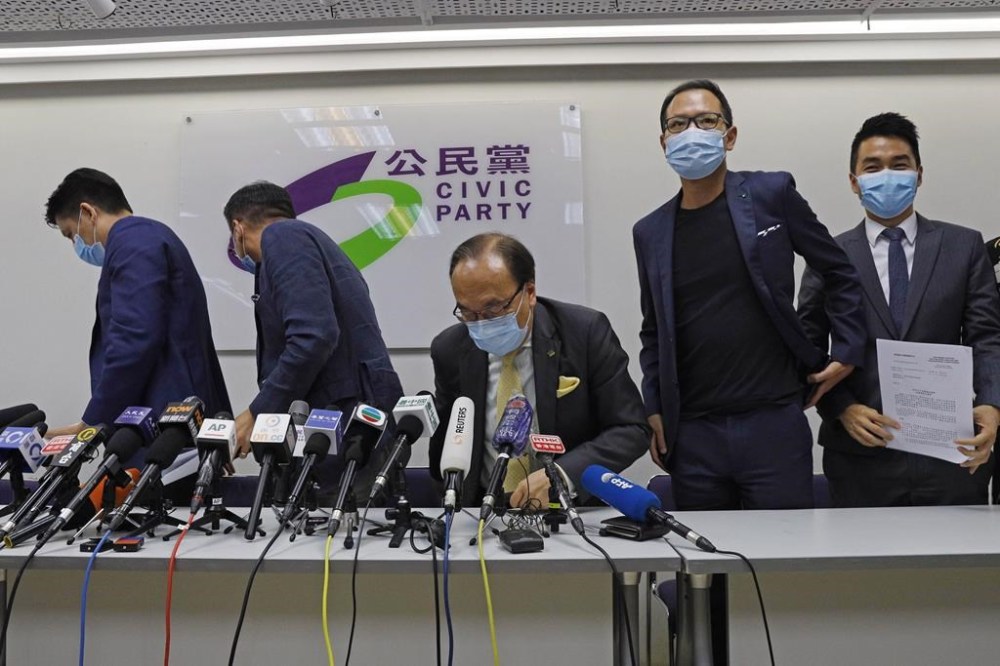Hong Kong’s 2nd largest pro-democracy party disbands amid political crackdown
Advertisement
Read this article for free:
or
Already have an account? Log in here »
To continue reading, please subscribe:
Monthly Digital Subscription
$0 for the first 4 weeks*
- Enjoy unlimited reading on winnipegfreepress.com
- Read the E-Edition, our digital replica newspaper
- Access News Break, our award-winning app
- Play interactive puzzles
*No charge for 4 weeks then price increases to the regular rate of $19.95 plus GST every four weeks. Offer available to new and qualified returning subscribers only. Cancel any time.
Monthly Digital Subscription
$4.99/week*
- Enjoy unlimited reading on winnipegfreepress.com
- Read the E-Edition, our digital replica newspaper
- Access News Break, our award-winning app
- Play interactive puzzles
*Billed as $19.95 plus GST every four weeks. Cancel any time.
To continue reading, please subscribe:
Add Free Press access to your Brandon Sun subscription for only an additional
$1 for the first 4 weeks*
*Your next subscription payment will increase by $1.00 and you will be charged $16.99 plus GST for four weeks. After four weeks, your payment will increase to $23.99 plus GST every four weeks.
Read unlimited articles for free today:
or
Already have an account? Log in here »
Hey there, time traveller!
This article was published 27/05/2023 (960 days ago), so information in it may no longer be current.
HONG KONG (AP) — One of the few remaining pro-democracy parties in Hong Kong voted to dissolve itself on Saturday, joining a growing list of organizations that have disbanded as authorities crack down on dissent.
Civic Party chairman Alan Leong told reporters that the dissolution of the party was a “writing on the wall” as there was no one to take over. None of its members at an extraordinary general meeting filed nominations for executive positions.
Thirty of the 31 members voted to disband, with one person abstaining.

The party, which was founded in 2006, was made up of mostly professionals, lawyers and academics. At its peak, it won six seats in the Hong Kong legislature during the 2012 elections, and was the city’s second-largest pro-democracy party after the Democratic Party.
Several members were charged with subversion under the sweeping national security law that was imposed by Beijing following massive 2019 protests calling for political freedoms that were promised the semi-autonomous territory after its handover from Britain in 1997.
They were accused of participating in an unofficial primary to pick up the best candidates for the legislative elections that would allow the pro-democracy camp to win a majority of seats. Authorities, however, said that the primary was aimed at subverting the government.
In a written statement, Leong thanked “all like-minded people who joined our long walk to democracy for different parts of the journey.”
“Today, the Civic Party is bidding Hong Kong farewell,” he wrote. “We hope Hong Kong people will live in the moment with a hopeful and not too heavy heart. Live in truth and believe in tomorrow.”
Since the national security law was passed, the city has undergone major changes to its political landscape. An overhaul of Hong Kong’s electoral system was made to ensure that only “patriots” loyal to China would be able to take office, and more than 200 people have been arrested for allegedly committing acts that endanger national security.
Many pro-democracy political organizations in Hong Kong have already disbanded. They include the protest organizer Civil Human Rights Front and the Hong Kong Alliance in Support of Patriotic Democratic Movements of China, which was behind the annual Tiananmen Square vigil to mark the 1989 massacre in Beijing of pro-democracy activists by Chinese soldiers. The vigil has been banned for the last three years.
The city, which used to be a bastion of free speech and expression, has not seen a large-scale pro-democracy protest since 2020.
___
See more of AP’s Asia-Pacific coverage at https://apnews.com/hub/asia-pacific

